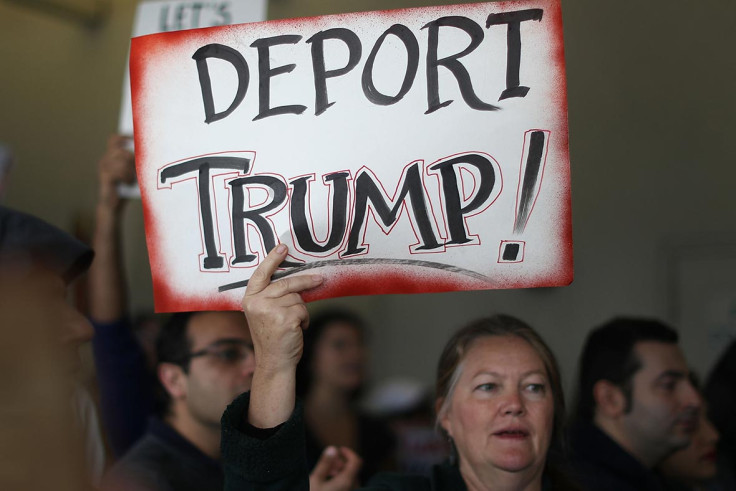Liberals are attacking Trump's ban in the worst possible way
They don't want the ban attacked on constitutional grounds. They just want to make it about them.
There are many grounds on which to criticise Donald Trump's executive order making it harder for the nationals of seven countries to enter the United States. Here are four of them.
First, it is over-hasty: the suddenness of the decision caught the federal authorities off-guard, causing chaos in the immigration service and the courts.
Second, it is arbitrary. The ban applies to Iranian, Iraqi, Libyan, Somali, Sudanese, Syrian and Yemeni nationals. According to a study by the Cato Institute, a respected free-market think-tank, no American has been killed on US soil by a national from one of the seven proscribed states since 1975. Thousands, by contrast, have died at the hands of citizens from Saudi Arabia, the UAE and Egypt – none of which is covered. Their exclusion has led to much speculation in the American media that President Trump has exempted places where he has business interests.
Third, a decision of this magnitude ought to be weighed by Congress. The American Constitution reserves matters of this sort to the legislature – and with good reason. It's true that previous presidents, not least Barack Obama, have also abused executive orders; but I don't see how that makes Trump's abuse any better.
Fourth, it is likely to be self-defeating. The contention of the Islamist extremists is that you can't be a good Muslim and a loyal citizen of a Western democracy. In banning people, in effect, on grounds of religion, rather than for any crime they have committed, the Donald is vindicating that contention. Relations between Americans and moderate Muslims are worse today than they were a week ago. That is in no one's interest – except, of course, the terrorists'.

If opponents of the ban focused on these four points, especially point three, they would unite all but the most committed Trumpsters behind them. A sensible line to take would go something like this: "We understand that Donald Trump has a mandate to tighten immigration restrictions after the recent election. We understand, too, that he is building on the policy of the previous administration, which also had different rules for states where the risk of terrorism was judged to be higher.
"But any change on this scale should be implemented temperately, following consultations with friendly governments in the Muslim world, taking account of the capabilities of federal agencies and, above all, with the consent of our lawmakers. The purpose of Congressional scrutiny is to improve legislation. If President Trump wants to alter our immigration policy, let him put his proposal before the two chambers – both of them, after all, under Republican control – and see what modifications emerge."
The trouble is, that all sounds a bit too judicious. It's far more fun to yell "You're a racist, whereas I – look how morally superior I am – I love all mankind!" Which is, broadly speaking, what the loudest opponents of the new policy have been doing. Well, OK, guys, whatever floats your boats. But I can think of few responses more likely to swing undecided Americans behind Trump. Outside the bubble, people won't see the president's unconstitutional behaviour. They will see the usual virtue-signalling from agitators whom they already think of as soft on terrorism.
Why, then, haven't opponents of the policy attacked it in a way that might convince others? Part of the problem is that, for years, Rightists decried executive over-reach whereas Leftists went along with it. When Barack Obama changed immigration policy without Congressional approval, in order to give an amnesty to millions of illegal entrants, his critics were dismissed as literal-minded obsessives. In consequence, few of Trump's opponents now feel comfortable arguing that it is wrong in principle for a president to alter immigration policy by executive order.
Nor do they particularly like to hear anyone else making the argument. A year ago, I wrote a piece in an American magazine warning that Obama's readiness to rule through executive order was setting a terrible precedent given who might succeed him: "If President Obama could disregard Congress over immigration policy," I argued, "so could President Trump."
When I tweeted a link to that piece yesterday, Leftists exploded. They didn't want the ban attacked on constitutional grounds. They wanted to let off steam. As George Orwell once put it: "Let's all get together and have a good hate."
All this seems certain to carry on. Donald Trump will continue to ignore constitutional propriety, and his opponents will continue attack him in a way that allows him to pose as the people's champion. And you know what? They don't care. Because, deep down, this isn't about immigration; it's about them. It always is.
Daniel Hannan has been Conservative MEP for the South East of England since 1999, and is Secretary-General of the Alliance of European Conservatives and Reformists. Follow : @danieljhannan
© Copyright IBTimes 2025. All rights reserved.






















